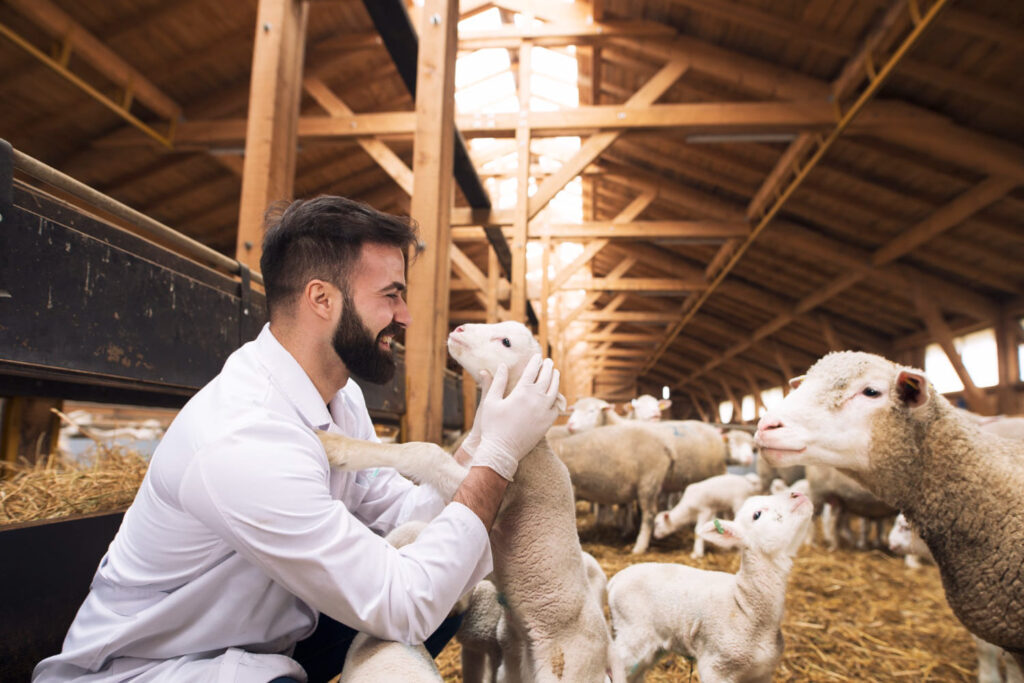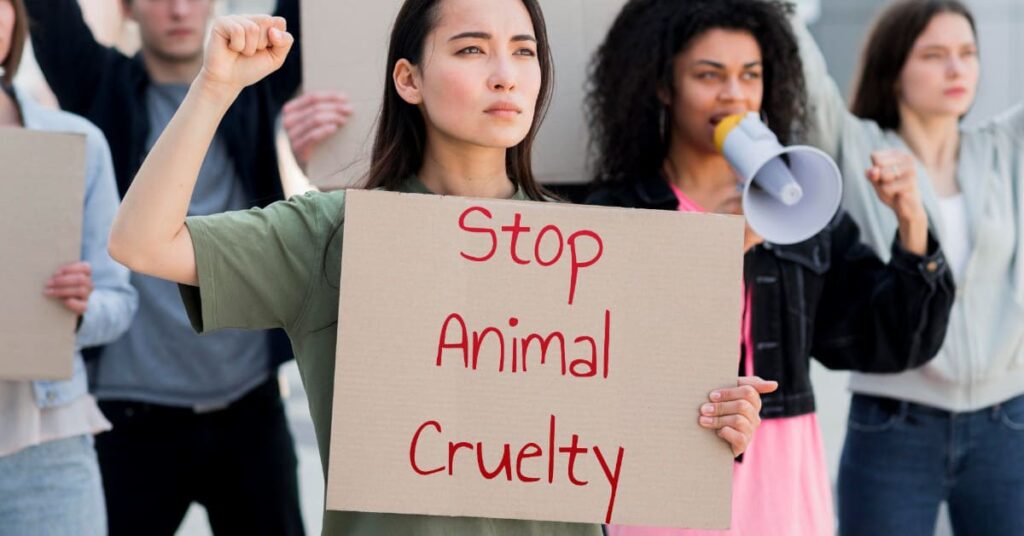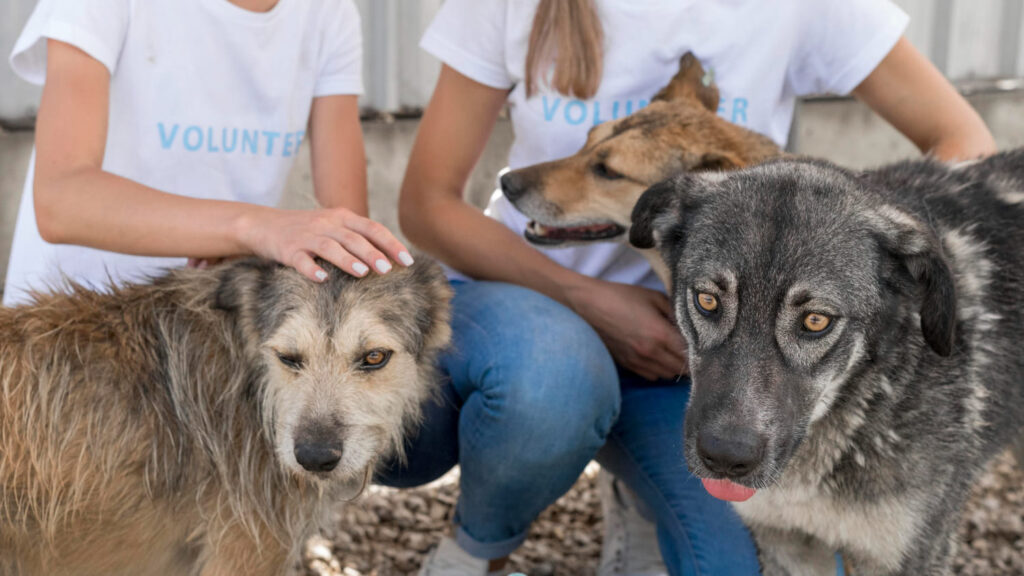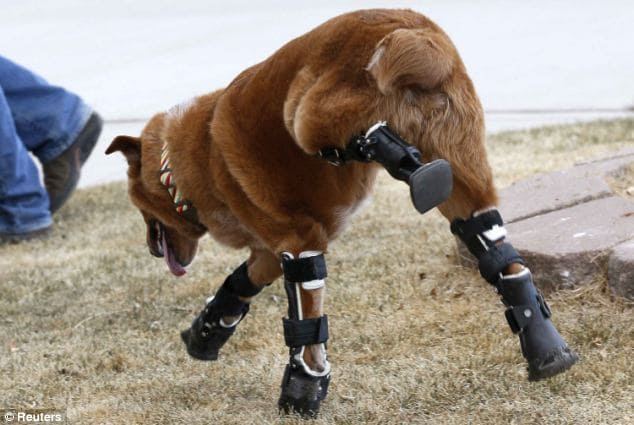Animal rights and advocacy have been a topic of discussion for many years. It is a cause that is close to the hearts of many individuals, like me, who believe that animals should be treated with the same level of respect and compassion as humans. But what exactly do we mean by animal rights and advocacy?
Definition of animal rights and advocacy
At its core, animal rights is the belief that non-human animals have basic moral entitlements that should be protected by law, just as human beings have such entitlements. This includes the right to life, freedom from suffering, freedom from exploitation, and the right to live in their natural habitats without interference.
Animal advocacy, on the other hand, involves taking action to protect these basic moral entitlements through various means such as political lobbying, demonstrations, education campaigns and individual activism.
Importance of Animal Rights and Advocacy in Society

The importance of animal rights cannot be overstated.
Not only is it morally wrong to treat animals inhumanely but also neglecting their welfare has negative effects on human health & economy (e.g. factory farming). Animals are an essential part of our ecosystem; they play important roles in maintaining balance in our environment.
Advocate groups work hard towards promoting more humane ways to interact with animals which benefits both humans & animals.
The History of Animal Rights and Advocacy

Frances Power Cobbe founded a number of animal advocacy groups, including the National Anti-Vivisection Society (NAVS) in 1875 and the British Union for the Abolition of Vivisection (BUAV) in 1898.
The concept of animal rights can be traced back thousands of years where different religions like Hinduism & Jainism advocated for non-violence against all living beings.
The modern-day movement for animal rights started during the 19th century with organizations like RSPCA formed with the goal to prevent cruelty towards horses being used for transportation at that time. The movement truly picked up momentum during mid-20th century when people became aware about the inhumane treatment of animals in science labs, slaughterhouses and even entertainment industries.
Many advocates groups were formed during this time which led to the creation of laws that protect animals from various forms of cruelty. Animal rights and advocacy is not just a “trendy” topic or something reserved for animal lovers only.
It is a serious issue that affects the well-being of millions of creatures who share this planet with us. In the following sections, we will discuss what animal rights entails, why it is important, and how we can work towards making a better future for all living beings.

Understanding Animal Rights
The Concept of Animal Rights
Animal rights are a fundamental concept that must be understood if we are to protect and promote animal welfare in our society. The idea of animal rights is based on the belief that animals have an inherent value, which is separate from their usefulness to humans.
In other words, animals have a right to exist, just like humans do. This means that we must treat animals with respect and dignity, and not use them solely for our own benefit.
The idea of animal rights has its roots in philosophy, where it was argued that all living beings have certain moral rights, regardless of whether they possess rationality or consciousness. This concept challenges the traditional view of animals as mere property or commodities, which can be used for food, clothing or entertainment without any regard for their welfare.
The Difference between Animal Welfare and Animal Rights
| Animal Welfare | Animal Rights | |
| Definition | Focuses on the well-being of animals and improving their treatment within human use | Focuses on the moral and legal rights of animals to be free from human exploitation and harm |
| Examples | Improving conditions for animals on farms and in laboratories | Advocating for the abolition of animal testing and factory farming |
| Key Organizations | American Society for the Prevention of Cruelty to Animals (ASPCA), World Animal Protection | People for the Ethical Treatment of Animals (PETA), Animal Legal Defense Fund |
Although animal welfare and animal rights are often used interchangeably, there is a significant difference between the two concepts. Animal welfare refers to the way in which we treat animals during their lives.
It involves providing them with adequate food, water and shelter as well as medical care when needed. On the other hand, animal rights go beyond this basic level of care by advocating for specific legal protections for animals such as protection against abuse or neglect.
This can include advocating for laws against practices like factory farming or animal testing. The difference between these two concepts is important because it highlights the need for us to not only provide basic care but also push for legal protections to ensure that all animals are treated humanely.
The Ethical Considerations Behind Animal Rights

The ethical considerations behind animal rights rest on the belief that all living beings have inherent value and should be treated with respect regardless of their utility to humans. This principle recognizes that just like humans; every individual has unique interests, desires, and experiences.
As such, we have a moral obligation to respect these interests and protect individuals from suffering. This ethical framework highlights the importance of animal rights as a necessary step towards promoting compassionate living, which recognizes the intrinsic value of all life.
Understanding animal rights is crucial if we are to advocate for their welfare effectively. It is only by recognizing that animals have inherent value that we can hope to create a world where they are treated humanely. By acknowledging the difference between animal welfare and animal rights and understanding the ethical considerations behind this concept, we can take steps towards creating a more compassionate society for all living beings.
Different Forms of Animal Advocacy

When it comes to advocating for animal rights, there are many different approaches that one can take. One popular method is through peaceful protests and demonstrations.
These events can bring attention to specific issues and help raise public awareness. Another approach is through lobbying efforts, where advocates work with lawmakers and other officials to push for changes in laws that affect animals.
Volunteering at animal shelters or rescue organizations is also a form of advocacy. By directly interacting with animals in need, individuals can make a difference in the lives of individual animals as well as contribute to larger advocacy efforts.
Online activism has become increasingly popular as well, with social media platforms being used to spread awareness and organize events. Petitions, letter writing campaigns, and boycotts are also effective ways to advocate for animal rights.
How to Become an Advocate for Animals

Becoming an advocate for animals does not require any special qualifications or degrees; it simply requires a passion for animal welfare and a desire to make a difference. The first step is educating oneself on the issues affecting animals such as factory farming, animal testing, and habitat destruction. From there, individuals can get involved in advocacy efforts by volunteering at local animal shelters or rescue organizations, donating money or supplies to these organizations or participating in peaceful protests and demonstrations.
Using social media platforms such as Twitter or Facebook can help spread awareness about specific issues surrounding animal cruelty or exploitation. Additionally, advocating for ethical treatment of animals through letters directed towards companies who engage in this practice could be an effective way of spreading the message.
The Impact of Advocacy on the Lives of Animals
Advocacy plays an important role in improving the lives of animals everywhere. Through peaceful protests which bring media attention towards various topics related to animal rights brings wider public attention towards these topics which helps drive change faster than usual otherwise. A great example of this was the successful push towards ending the use of animal testing in cosmetics.
This change was driven by advocacy efforts from organizations such as PETA and other animal welfare groups. Advocacy has also brought attention towards issues surrounding factory farming, which have led to legislative changes and a wider adoption of ethical farming practices.
Through continued efforts, advocacy could lead to the end of cruel practices such as bear bile harvesting, dog meat trade and elephant rides. Becoming an advocate for animals is a powerful way to create positive change in the world.
By taking action against animal cruelty and exploitation through various forms of protest and spreading awareness is important for driving change. The impact of these efforts can improve the lives of individual animals as well as contribute to larger advocacy campaigns aimed at creating long-lasting change.
Animal Rights Issues Today
Animal Testing: Pros, Cons, and Alternatives
Animal testing is a controversial issue in the scientific community as it has contributed to many medical breakthroughs over the years but at what cost? Animals used for testing are often subjected to painful procedures without any pain relief or anesthesia. Many tests have proven ineffective when trying to translate results into humans.
Thankfully there are alternatives available such as computer modeling or human tissue cultures that could replace animal testing altogether. It’s important for us as consumers to support companies who use alternative methods and put pressure on those who still use animal testing by refusing to buy their products.
Wildlife Conservation Efforts

As humans continue to take over natural habitats for agriculture or urbanization purposes, many species around the world face extinction. Wildlife conservation efforts aim to protect these endangered species through habitat preservation and breeding programs. However, there is still much work to be done in terms of educating people about the importance of respecting all living creatures.
Poaching, trophy hunting, and wildlife trafficking still pose major threats to many species. It’s important for us to support organizations that promote wildlife conservation efforts and to limit our own impact on the environment by reducing waste, choosing sustainable products, and supporting eco-friendly policies.
Animal rights issues today are complex and multifaceted but it’s important to recognize the negative impacts of our actions on animals, whether it be through factory farming, animal testing, or habitat destruction. As consumers and individuals, we have the power to make a difference by supporting ethical alternatives and speaking out against inhumane practices. Let’s work towards a world where all living creatures are respected, protected, and given the chance to thrive.
Famous Animal Rights Advocates
Whistleblowers and Activists: The Brave Few Fighting for Animal Rights

Animal rights advocacy is a cause that has been taken up by many well-known individuals over the years. One of the most famous examples is Jane Goodall, who spent her life studying chimpanzees and advocating for their welfare. Through her work, Goodall has become an icon in the animal rights community, showing people around the world that we must treat all living beings with compassion and respect.
Another animal rights advocate who made a big impact was Henry Spira. Spira was responsible for exposing the cruel practices of major corporations like Revlon and KFC.
He did so by organizing boycotts, protests, and media campaigns, which eventually led to widespread changes in corporate policies. In today’s world of social media activism, there are also many young celebrities who are using their platforms to speak out about animal cruelty.
For example, Joaquin Phoenix used his Academy Awards acceptance speech to call attention to the issue of factory farming. Similarly, Leonardo DiCaprio has been vocal about his support for wildlife conservation efforts.
The Contributions of Famous Animal Rights Advocates
One of the biggest contributions that famous animal rights advocates make is raising awareness about animal cruelty issues. By speaking out publicly against practices like animal testing, these individuals help bring attention to these problems and inspire others to take action.
In addition to raising awareness, famous advocates also often donate large sums of money towards animal welfare causes. For instance, Ellen DeGeneres and Portia de Rossi have donated millions towards wildlife conservation efforts around the world.
Moreover, many famous advocates use their celebrity status as a platform to promote veganism or vegetarianism as a way to reduce harm towards animals. Through their public appearances or social media posts promoting plant-based diets or humane treatment of animals, they inspire people to make small changes in their own lives that can lead to a significant positive impact.
The Impact of Famous Animal Rights Advocates on Society
Famous animal rights advocates have had a significant impact on society by changing attitudes towards animal welfare. Through their activism and work, they have helped shift societal values towards greater compassion and respect for animals.
For example, the efforts of famous advocates like Paul McCartney and Morrissey have led to more humane treatment of farm animals in the UK. Similarly, the widespread criticism of SeaWorld’s treatment of killer whales led to a decline in attendance at the theme park and eventually forced it to stop breeding them.
Their work has also inspired a new generation of individuals who are passionate about animal rights advocacy. By seeing the impact that famous advocates have had, young people are motivated to take up this cause themselves and create positive change in their communities.
Famous animal rights advocates have played an essential role in raising awareness about animal cruelty issues, donating money towards animal welfare causes, promoting plant-based diets or humane treatment of animals. Their efforts have changed attitudes towards animal welfare leading to a greater sense of compassion and respect for all living creatures.
They inspire many young people who are motivated by their work and create positive change in their own communities. We must learn from these activists’ contributions as well as support them so that they can continue making meaningful strides forward for animals everywhere.
Animal Rights Organizations
There are numerous animal rights organizations operating across the world, with the aim of protecting animal welfare and promoting their rights. These organizations work tirelessly to raise awareness on issues such as animal cruelty, factory farming, and wildlife conservation. They also work towards implementing laws that protect animals and hold offenders accountable for their actions.
PETA – People for the Ethical Treatment of Animals
PETA is arguably one of the most well-known animal rights organizations in the world. Founded in 1980, PETA has been at the forefront of many campaigns that have led to significant changes in how animals are treated. They advocate against factory farming, animal testing, and other forms of animal exploitation.
Their campaigns often involve controversial tactics such as public protests and celebrity endorsements to bring attention to their cause. PETA has also been known to use shock tactics in their advertisements which have sparked controversy among those who feel they go too far.
The Humane Society of the United States
The Humane Society is another prominent organization that focuses on animal welfare issues. Founded in 1954, they work towards ending puppy mills, wildlife conservation efforts, and fighting against commercial hunting practices.
The organization collaborates with other groups around the world to create impactful change for animals all over the globe. Their website provides resources for pet owners looking to provide proper care for their pets as well as educational materials about animal welfare issues.
Animal Welfare Institute
The Animal Welfare Institute (AWI) tackles a wide range of issues related to animal protection including farm animals’ treatment in agriculture’s food supply chain or people feeding stray cats or dogs which can lead them into danger zones or sometimes death itself. AWI works hard at raising awareness about specific issues related to animal welfare and works to promote laws that protect animals. They are involved in international efforts to protect marine life, working with governments around the world to prevent overfishing and other practices that harm aquatic animals.
World Animal Protection
World Animal Protection is a global organization that works towards ending animal cruelty and improving their welfare. They work with communities all over the world, providing education and resources about how to humanely treat animals. Their aim is not only to alleviate animal suffering but also change attitudes towards animals.
World Animal Protection campaigns focus on ending bear bile farming in Asia, promoting humane treatment of wildlife, reducing the number of stray dogs and cats through spay/neuter programs as well as helping improve farm animal conditions globally. All of these organizations play a crucial role in promoting animal rights and advocating for their welfare.
They provide valuable resources for those looking to get involved in animal advocacy themselves. It’s important that we all do our part to support them however we can whether by donating time or money or spreading awareness about these issues as well as adopting pets from shelters instead of buying them from pet shops or breeders.
The Future of Animal Rights and Advocacy
Possible Advancements in Technology that Could Help Improve the Lives of Animals

As we enter the age of technological advancements, it is essential to look at how these advancements can be used to help improve the lives of animals. One exciting development is the use of 3D printing technology to create prosthetics for animals with missing limbs.
Not only does this provide them with greater mobility, but it also improves their overall quality of life. Another area where technology can play a significant role is in monitoring and tracking animal populations.
With GPS tracking devices and other technologies, conservationists can better understand animal behavior and migration patterns, which can lead to more effective conservation efforts. There are new developments in alternative food sources that could help reduce our dependence on factory farming.
Lab-grown meat is one such example that has made significant strides in recent years. This could potentially revolutionize the way we view food production, reduce animal suffering, and lessen our impact on the environment.
How Society’s Attitude towards Animals is Changing
In recent years, there has been a significant shift in society’s attitude towards animals. Many people are starting to recognize animals as sentient beings capable of experiencing emotions and pain rather than mere commodities for human use.
This shift can be seen in the rise of veganism and plant-based diets as people become more aware of the impact their food choices have on animals, human health, and the environment. Additionally, laws protecting animal rights have been passed worldwide as governments begin to recognize their responsibility towards non-human beings.
However, there is still much work to be done in promoting animal rights and changing societal attitudes towards them. Education plays a crucial role here – teaching children from an early age about compassion towards all living beings could go a long way to changing attitudes for future generations.
What We Can Do as Individuals to Help Promote a Better Future for All Living Creatures
As individuals, we have the power to make a difference in the lives of animals. One simple step we can take is to adopt a plant-based diet or reduce our consumption of animal products. This not only reduces animal suffering but also has significant environmental benefits.
We can also support animal rights organizations by volunteering our time, donating money, or attending their events. Participating in advocacy campaigns and speaking out against animal cruelty is another way we can make our voices heard.
Additionally, we can educate ourselves and others about animal rights issues and how we can work towards creating a more compassionate society. This could involve attending workshops and presentations or reading books that delve into these topics.
The future of animal rights and advocacy looks promising with advancements in technology helping to improve the lives of animals. However, there is still much work to be done in changing societal attitudes towards non-human beings and promoting their welfare.
You have the power to make small but significant changes that could lead to a better future for all living creatures.
Let us do our part by educating ourselves, supporting animal rights organizations, and making ethical choices in our daily lives.
Animal rights and advocacy is a topic that is incredibly important in our society. We must recognize the importance of treating all creatures with the respect they deserve, as living beings with their own thoughts, feelings, and experiences.
As we continue to learn about animal rights and advocacy, it is clear that there is still much work to be done. It is time for us to take responsibility for our actions and their impact on animals.
We must shift our focus away from using animals for our own benefit and instead start working towards creating a world where they can live peacefully alongside us. This means supporting organizations that promote animal welfare, reducing our meat consumption or cutting it out completely, reducing plastic waste that harms marine life, among others.
We need to create a culture of compassion towards all living creatures by educating ourselves about the issues surrounding animal rights and advocating for change. Every action counts – every dollar towards an animal charity helps provide food or medical care for an animal in need.
Every conversation about these issues helps raise awareness. Together we can make a difference in the treatment of animals around the world.
It will take time but through education, activism and advocacy we can improve the lives of millions of sentient beings who share this planet with us. Let’s work together to create a better future for all living creatures; one where every being has equal rights to exist without unnecessary harm or suffering.
